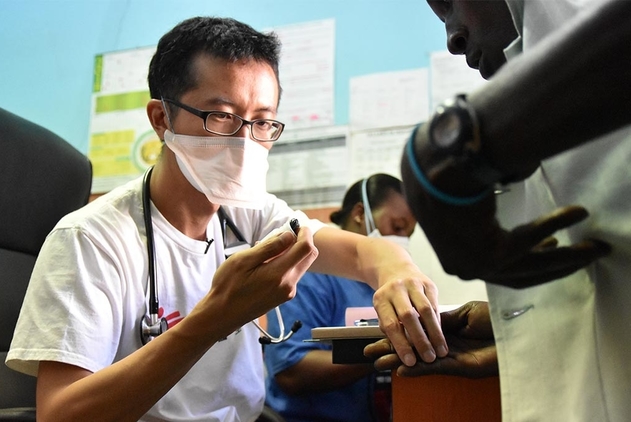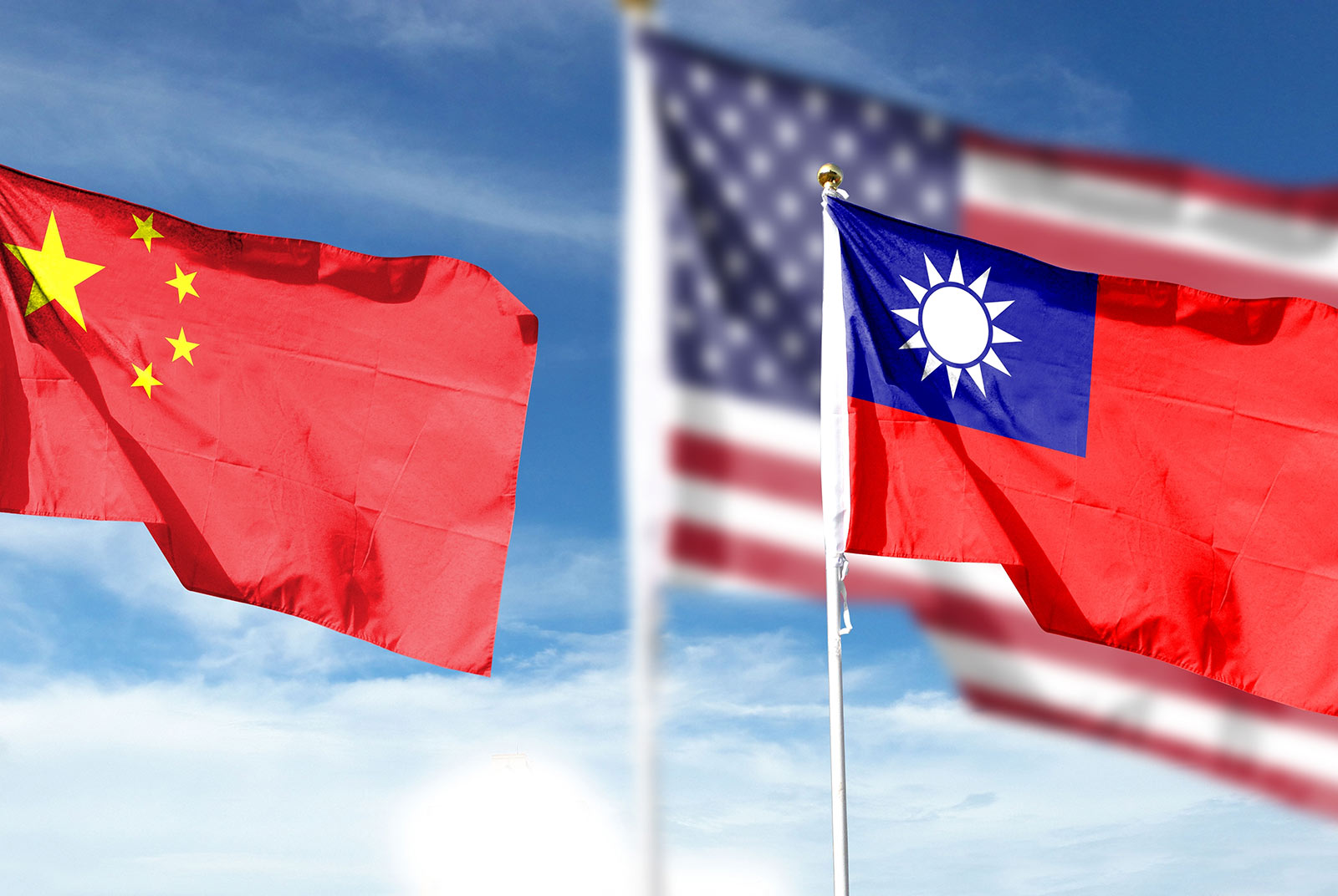World Health Organization
Still a WHO Outsider, Taiwan's Role in the Global Organization

Source:Anne Chang/MSF, CC by 2.0
Taiwan has made concerted efforts in recent years to gain entry into the World Health Organization (WHO) as an observer member. Apart from raising the country’s visibility, what access to information, as well as rights and responsibilities, would Taiwan enjoy after joining the WHO?
Views
Still a WHO Outsider, Taiwan's Role in the Global Organization
By Li Chun Hsunweb only
Snowy Hokkaido, Paris at night, springtime in Washington, D.C., summer in Mexico… avid Taiwanese travelers have been making tracks around the globe for quite some time now. Meanwhile, thanks to global trade and the convenience of modern transportation, online orders can be delivered to one’s doorstep with the click of a mouse.
Apart from enjoying the conveniences of globalization, the expediency of today’s transportation has also introduced concerns about contagious disease as more people move around. Airplanes don’t just carry they can also carry disease carriers over borders. From the transmission of the Ebola virus to SARS - the memory of which still strikes fear - diseases can follow transportation routes to spread around the entire world.
Impacted by globalization, worldwide health has also seen a sort of butterfly effect, where if Asia sneezes a ripple travels across Europe. The international community has begun to take note, and is starting to discuss approaches to health management under globalization. The spread of viruses is especially concerning to the international community, as whenever a disease starts spreading, it harms not only the local population, but could impact people all over the globe. (Read: The World Health Organization is Preparing for ‘Disease X’)
Taiwan has made concerted efforts in recent years to gain entry into the World Health Organization (WHO) as an observer member. Apart from raising the country’s visibility, what access to information, as well as rights and responsibilities, would Taiwan enjoy after joining the WHO?
In this article, we will take a look at the basic functions and responsibilities of the WHO, and further examine what regulations under the WHO structure can be applied in response to global health incidents and crises.
WTO Atop Global Health Information
No discussion of health management would be complete without mentioning the World Health Organization, an agency that is not only in charge of worldwide health management and disease control worldwide, but whose work also touches upon such aspects as food safety and occupational environments, exerting an impact on everything from physical health to mental health. Wherever human health is concerned, the WHO is involved.
The WHO, an intergovernmental health organization headquartered in Geneva, Switzerland, is the agency under the United Nations system in charge of health. Against the backdrop of sophisticated global trade and transportation, the WHO has begun incorporating discussion of any and all health-related issues as they occur, positioning itself as a leader in global health.
As public health development tends to stress a more vertical model, or “top-down” cooperative chain, how nations work with other non-governmental organizations (NGOs) or private agencies to play an instrumental role in safeguarding people’s health worldwide is a frequent topic of discussion in the area of global health governance.
So what roles do international law and individual nations play under health management? The following section introduces the International Health Regulations most relevant to disease management and the health environment under the WHO.
International Health Alerts Can Be Legally Binding
The SARS outbreak of 2003 sent Taiwan into a nationwide panic. In response, Taipei’s Heping Hospital was re-dedicated as a center for treating and containing the epidemic. If China had only provided the obligatory timely reports to the WHO on the spread of the disease before the SARS outbreak, would Taiwan not have been able to prevent SARS from entering?
The WHO undertook an overhaul of International Health Regulations in 2005 to better align with the expectations of the modern international community. As part of the revisions, it incorporated many diseases and major health events among the new regulations included for mandatory reporting. International health regulations, formulated by the World Health Assembly, are mainly intended to control the spread of diseases under globalization.
The International Health Regulations were passed in accordance with Article 22 of the WHO’s Constitution. Accordingly, whenever a new regulation is passed, unless a member country explicitly objects or has reservations when informed of its passage, all member nations are automatically bound to its provisions.
This differs from most international regulations. Generally speaking, international agreements are subject to national approval before becoming binding to the respective nation. Thought of in a different way, prior to the establishment of the WHO, the body’s members embedded tacit consent to the World Health Assembly in its Constitution, making it a document with direct binding effect.
International health management depends on considerable international cooperation and information sharing. Accordingly, the International Health Regulations of 2005 placed emphasis on these areas. Under the 2005 revisions, the biggest accomplishment of the International Health Regulations was surely the establishment of the Global Emergency Alert Framework.
Under the framework, each member nation must establish a national focal point for communications and receiving global health information. In addition, each nation must follow set procedures in the event of major public health incidents, alerting the WHO of major incidents, which then notifies all member nations so that their health units can prepare timely responses.
The formation of such a communications network enables the international community to respond quicker to the spread of disease and health disasters. Upon learning of such a public health calamity, the WHO can make recommendations for each country to weigh, such as Customs border control, bans on entry, or treatment of illnesses. The regulations also provide options for member nations in response to prevention and quarantine for transportation on land, sea, and in the air.
At the same time, if an individual entering a country is possibly infected with a disease, the regulations provide member nations with measures and justifications for refusing the carrier entry. In addition, the 2005 International Health Regulations expanded alerts for contagious diseases to all diseases and major health incidents, no longer limiting alerts to such diseases as cholera, epidemic typhus, smallpox, relapsing fever, yellow fever, and plague.
In 2009, the WHO agreed to include Taiwan under the Global Epidemic Alert and Emergency Response Framework under the umbrella of the International Health Regulations, enabling direct communication and interaction with the WHO.
Although Taiwan is still neither a WHO member or observer, we have been able to establish a contact window through which to directly receive global health information, thus significantly strengthening Taiwan’s position in global health management.
Have you read?
♦ Taiwan’s Soft Power and Global Climate Change Initiatives
♦ From GATT to WTO, Taiwan’s Global Chess Match
♦ Taiwan-Based NGO Helps Nepalese Earthquake Victims
Global Infectious Disease Control Efficacy Correlates with Countries’ Determination
Although such is the letter of the global health regulations, disease outbreak alerts between member nations are still insufficient. For instance, when the 2009 H1N1 flu outbreak began in the U.S. and Mexico, though the spread of the disease was outpaced by the speed of alerts, within a few short months it became widespread across the U.S. Insufficient recognition of the disease caused nearly 260,000 people in America to become infected during hospital stays.
Consequently, effective disease controls and strengthening communication among nations have become major priorities in global health. In view of this, the WHO sought to harmonize the International Health Regulations and Joint External Evaluation in order to help member nations better implement health status reports and achieve global health governance through external oversight.
Today, there is still little interaction between global health management and international law. Of the international conventions promoted by the WHO to date, besides the International Health Regulations, there is also the Nomenclature Regulations and Framework Convention on Tobacco Control, passed in accordance with the terms of Article 22 of the WHO Constitution. Although small in size, it has increasingly highlighted the need in global health for participation in international law as an intermediary.
Still, the challenges confronting global health law today are not about the content of regulations, but rather the determination of decision-makers, and how forcefully they implement regulations. How to build political momentum between countries and executional capacity will depend on the international community’s ability to respond to global health incidents.
Translated by David Toman
Edited by Sharon Tseng

Crossing features more than 200 (still increasing) Taiwanese new generation from over 110 cities around the globe. They have no fancy rhetoric and sophisticated knowledge, just genuine views and sincere narratives. They are simply our friends who happen to stay abroad, generously and naturally sharing their stories, experience and perspectives. See also Crossing Arab World.
Original content can be found at the website of Crossing: 儘管被 WHO 拒於門外,台灣仍是「全球疫情通報及防治體系」的一員──究竟衛生情報多重要?有何影響?
This article is reproduced under the permission of Crossing. It presents the opinion or perspective of the original author / organization, which does not represent the standpoint of CommonWealth magazine.







